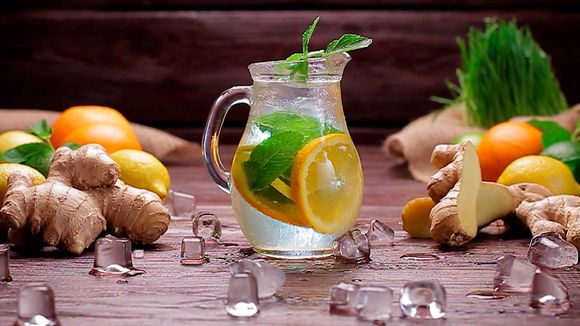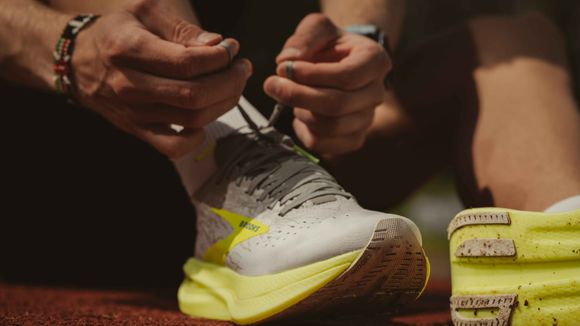Turmeric's Curcumin: Nature's Anti-Inflammatory Gift
Turmeric (Curcuma longa), a vivid yellow spice commonly found in Indian cuisine, contains curcumin—a powerful compound recognized for its anti-inflammatory properties. Numerous studies have highlighted curcumin's potential to reduce pain and swelling in arthritis patients. One practical way to harness its benefits is by creating a turmeric milk concoction. Combine a teaspoon of turmeric powder with warm milk, a touch of honey, and a pinch of black pepper to enhance absorption.
Ginger: A Spicy Solution to Joint Stiffness
Ginger (Zingiber officinale), known for its zesty flavor, boasts anti-inflammatory and analgesic properties. Incorporating ginger into your daily routine can aid in alleviating joint pain and stiffness. Crafting a ginger tea is a delightful approach to reaping its rewards. Slice fresh ginger root, steep it in hot water for 10-15 minutes, and consider adding a dash of lemon and honey for enhanced flavor.

Photo by Jugoslocos on Unsplash
Fenugreek: Ancient Seeds for Modern Joint Comfort
Fenugreek (Trigonella foenum-graecum) seeds contain compounds with potent anti-inflammatory effects. These seeds are rich in fiber and essential nutrients, making them a valuable addition to arthritis management. Preparing a fenugreek paste involves soaking the seeds overnight, grinding them into a paste, and applying it to the affected joints for approximately 30 minutes.
Eucalyptus Oil: Cooling Relief for Aching Joints
Eucalyptus oil (Eucalyptus globulus) is celebrated for its invigorating scent and potential pain-relieving properties. Its cooling sensation can provide much-needed relief from joint discomfort. To create an eucalyptus oil massage oil, mix a few drops of eucalyptus oil with a carrier oil like coconut or olive oil. Gently massage the blend onto your aching joints for soothing comfort.

Photo by Sincerely Media on Unsplash
Ajwain: Carom Seeds for Warmth and Relief
Ajwain, or carom seeds (Trachyspermum ammi), is a popular Indian spice renowned for its potential to combat arthritis symptoms. Ajwain seeds contain thymol, a compound with anti-inflammatory and analgesic properties. Crafting an ajwain-infused oil involves heating a tablespoon of ajwain seeds in two tablespoons of mustard oil until they turn brown. Once cooled and strained, this oil can be massaged onto the joints for warmth and relief.
Anticancer Potential: Unveiling Nature's Hidden Gems
Several of these remedies also boast potential anticancer properties. Turmeric, with its active compound curcumin, has demonstrated promising effects against cancer cells in laboratory studies. Similarly, ginger's bioactive components have been explored for their cancer-fighting potential. While further research is needed, these natural remedies might offer additional health benefits beyond arthritis management.
Questions and Answers
Q: Can these remedies fully replace medical treatment for arthritis?
A: While these remedies offer relief, they are not substitutes for medical treatment. Consult a healthcare professional for comprehensive arthritis management.
Q: Is it safe to use these remedies alongside prescribed medications?
A: Always consult your healthcare provider before combining remedies with medications to prevent potential interactions.
Q: Can children and the elderly use these remedies?
A: In most cases, these remedies are safe for all ages. However, consulting a healthcare provider is advised, especially for children.
Q: Are there dietary modifications that complement these remedies?
A: A diet rich in anti-inflammatory foods can enhance these remedies' effects. Consult a nutritionist for personalized advice.
Q: Where can I find these natural remedies' ingredients?
A: Local markets, health food stores, and online retailers often carry these ingredients. Opt for organic and reputable sources whenever possible.
References
- https://www.ncbi.nlm.nih.gov/pmc/articles/PMC5664031/
- https://www.ncbi.nlm.nih.gov/pmc/articles/PMC3633300/
- https://www.ncbi.nlm.nih.gov/pmc/articles/PMC3665023/
- https://www.ncbi.nlm.nih.gov/pmc/articles/PMC3016669/
- https://www.ncbi.nlm.nih.gov/pmc/articles/PMC5951391/
- https://pubmed.ncbi.nlm.nih.gov/19379318/
- https://www.ncbi.nlm.nih.gov/pmc/articles/PMC4103721/
- https://www.ncbi.nlm.nih.gov/pmc/articles/PMC5930415/
- https://www.ncbi.nlm.nih.gov/pmc/articles/PMC3523208/
- https://pubmed.ncbi.nlm.nih.gov/24146445/
- https://www.ncbi.nlm.nih.gov/pmc/articles/PMC5003001/
- https://www.ncbi.nlm.nih.gov/pmc/articles/PMC5987252/









